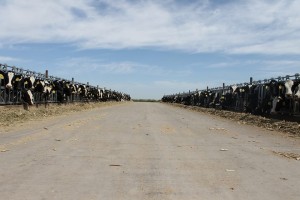A couple of months ago, I wrote an article for Dairy Herd Management magazine discussing an important court decision in Washington that could have wide-ranging implications on agriculture.
Community Association for Restoration of the Environment v. Cow Palace, LLC, was filed by two environmental groups (Community Association for the Restoration of the Environment and the Center for Food Safety) against a Washington state dairy. The Cow Palace Dairy ran a herd of 11,000 cows in the Lower Yakima Valley of Washington. A decision was issued in January by the United States District Court for the Eastern District of Washington.

Legal Issues
One of the key issues in this case was the question of whether manure from a dairy stored in lagoons, used as fertilizer on fields, and composted is considered a “solid waste” under the federal Resource Conservation Recovery Act (“RCRA”) and poses an “imminent and substantial danger to public health and the environment.” Plaintiffs argued that the dairy’s manure storage, application, and composting methods contributed to high levels of nitrates in area groundwater.
This is an important question because if manure is not a solid waste, as the farmer argued, the RCRA would not apply to the dairy’s activities. If, on the other hand, manure is found to be a solid waste, the dairy is then subject to the provisions on RCRA, including a prohibition on open dumping. This would require additional federal permits for operations deemed as having solid waste.
Under RCRA, solid waste is defined by statute as “any garbage, refuse…and other discarded material, including solid liquid, semisolid or contained gaseous material resulting from…agricultural operations.” Open dumping is defined as disposal of solid waste in any facility or location that is not a sanitary landfill.
Ruling
The court sided with the plaintiffs, finding that manure met the definition of solid waste. The court reasoned that manure falls within the term “discarded material” when it is over applied to fields or stored in such a way it seeps into the groundwater. In these instances, the manure is no longer beneficial as a fertilizer, and is, instead, a solid waste.
Importantly, the court noted that when agricultural manures were properly applied as a fertilizer, the manure would be exempt from the RCRA provisions. Based on the facts of this case, the court found that because the dairy “excessively over-applied manure to their agricultural fields” that constituted discarding of the manure, making it a solid waste. The court noted that the dairy did not adhere to state guidelines and best management practices for manure application.
A particularly concerning part of the court’s reasoning in this case is the fact that the lagoons at issue were NRCS compliant. Nevertheless, the court found that because leakage occurred, it met the definition of solid waste because it was discarded materials.
Finally, the court found that the dairy’s composting practices also fell within the definition of solid waste because the manure was placed in an unlined composting area and allowed to leach into the ground, making it discarded product.
The court determined that issues of fact existed as to other issues, for which a trial will now be held in March. Once a verdict has been rendered from that trial, given the serious implications this case could have on the agricultural industry, the dairy, with support of other agricultural groups, could appeal this decision to the United States Court of Appeals for the Ninth Circuit.
Recent Update
Just last week on May 11, it was announced that the dairy has agreed to a settlement with the environmental groups. Under the settlement, which has not yet been approved by the court, the dairies will limit their application of manure, use double liners in lagoons, and provide clean drinking water to residents until the contamination is cured. [Read article here.]
Concerns for Producers
Producers should be concerned about the potential application of RCRA on their manure storage and application practices. This case could open the door for environmental groups to file suit against dairies and other agricultural operations for their manure management practices. Also concerning, is that if the groups’ lawsuits were successful, the defendants could be required to pay the plaintiffs’ attorney’s fees. Lastly, if operations are found guilty of violating RCRA, they would not only have to prevent open dumping of solid waste going forward, but could also be required to remedy any damage previously caused. Although this case would not be binding precedent beyond Washington State, it could offer persuasive authority for plaintiffs to bring similar claims in other jurisdictions.
What Can We Learn?
The key lesson for producers to take from this case is the importance of ensuring proper storage and application of manure. Here, because the court found the dairy had excessively applied the manure and it seeped into the groundwater supply, it was found to be a solid waste. Without these facts, the mere use and storage of manure would not fall within the RCRA provisions. Moreover, although the dairy’s lagoons were approved by NRCS, the fact that they leaked was evidence for the court that manure constituted a solid waste. Thus, it is critical for dairies to do their best to ensure no leakage occurs. Producers should carefully develop a detailed written manure storage and application plan and then strictly follow the developed guidelines.











